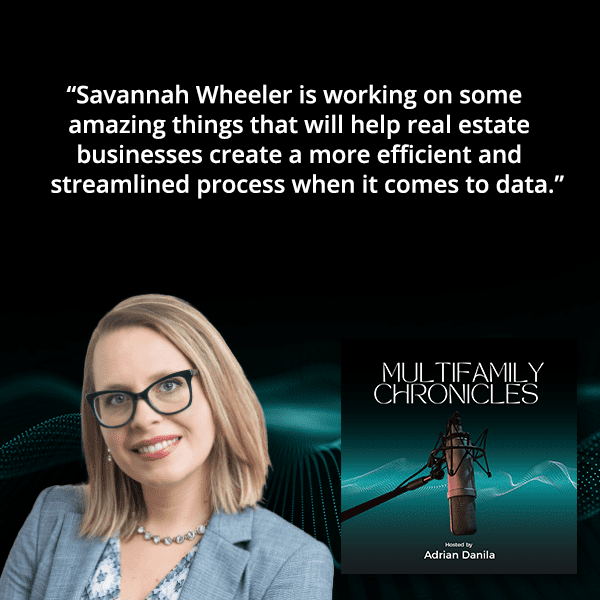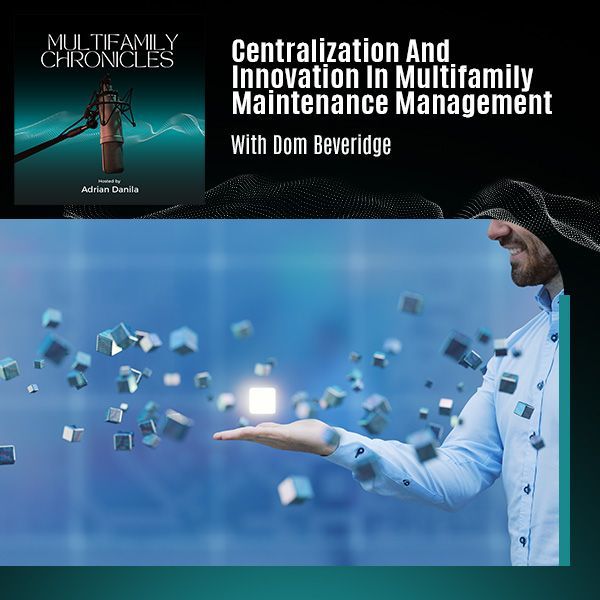Savannah Wheeler On Navigating Through the Multifamily Industry By Leveraging Technology
Navigating through real estate can be challenging, especially during a market's downturn. But with tools available on hand, it would be much easier to navigate the industry. Adrian Danila welcomes our guest brings a lot of value on technological tools behind the real estate industry. Savannah Wheeler, the CEO of Apartment Snapshot, shares how you can navigate the real estate market by leveraging technological tools. One of the kickbacks of getting people to look at the data is not about time but accessibility. If looking at the data is made easier, it would be easier for people to understand it. Learn more from Savannah Wheeler today!
---
Watch the episode here
Listen to the podcast here
Savannah Wheeler On Navigating Through the Multifamily Industry By Leveraging Technology
I have with me Savannah Wheeler. Welcome to the show.
Thank you.
You are the Chief Executive Officer of Apartment Snapshot. You are also a returning guest on our show. You've been here a few episodes ago. For those that didn't watch the first episode, I want you to start by introducing yourself. Tell us a little bit about yourself, your background and how you came up in the industry.
Thank you for having me again. I'm super excited to be back on the show and continue our conversation. I have been in the real estate industry since I was eighteen. I've been in multifamily for a long time on both the owner’s side and the management operator’s side. I've been with owner-operator and third-party management. I feel like I've seen a lot in our industry. There's a lot I haven't seen too.
I have worked primarily in finance technology and data analytics. The last time we spoke, I was with Avanti Residential. Now, as you say, I've moved to the dark side. I'm a vendor partner with Apartments Snapshot, which is new to-the-market prop tech mobile-first platform that's bringing performance metrics and KPIs to the hands of everyone in our industry and utilizing gamification to make data fun. I'm super pumped and excited about the opportunity. It is a unique opportunity for me to use my experience, data and analytics and technology within the multifamily space, having seen much technology in our industry providing a unique perspective on the problems that we're trying to solve with this new technology.

This is perspective. You spent many years in operation multifamily operations. You moved up to the Vice President role. It is an amazing accomplishment. During your journey, you had to deal with a lot of technology. You were the end user of a lot of technology. You're able to say, “What this technology does?” You were the one to say, “This part of the application or the software doesn't solve the purpose,” which is being beautiful. Tell me from your perspective, what are some things that a company that is looking to purchase software is on the market, or they're looking at technology in order to support their leasing, marketing or minus efforts, in general, to help them with operations? What things should they be looking for when they're wearing a piece of software or application like this?
I did spend a lot of my time in my career betting technology, having not only run a technology department and be responsible for the implementation but also leading and advisory board on determining from a company perspective, what technologies we need, what problems we're solving and who we're solving them for. It's a tricky time for vetting technology because years ago, we were labeled as behind in technology as an industry. Being that we are a competitive industry, we took that challenge to catch up with the proptech companies swept in with all these new technologies. After chasing these shiny new toys for many years, I would say that our industry is very tech-saturated. It's even more important when we're feeling that tech saturation.
Our teams are feeling that tech saturation to be very intentional about vetting out new technology and what it's doing for the team. Asking questions and involving the right people are two key factors and making sure that you're making the right decision. Asking questions about, “Who is this new technology serving and our company and what are the actual pain points those stakeholders are feeling?” and would like you to focus on or solve for.
Not just it's a shiny new toy, we went to NAA, we saw it and it's great. Who are you solving a problem for and what is that problem that you're trying to solve? Is this technology a new technology and add to your current tech stack or is it a replacement of the existing technology? Will it consolidate and reduce the workload that your teams are feeling or is it going to expand and add more tasks to their to-do list? If it is inherently a change, any technology you implement is a change, but taking a moment and considering that change management, how does that change management impact your team at the corporate, regional or onsite level? How does that change affect your teams? How many times have you made a change similar to this in the recent past?
How do those constant changes impact their performance and their ability to do their jobs? Also, thinking about taking the time to understand their natural workflow. How do they naturally work during the day? How will this technology augment their workflow instead of disrupting their workflow? How will this fit into their workflow and help them do their job more efficiently, better and faster or take some things off their plate versus completely disrupting their workflow and causing that frustration?
Those are some questions that are important to ask when you're considering a new technology. In addition to asking those questions, making sure that you have the right people or stakeholders of helping to evaluate and ask those questions is important. Often, it will be corporate evaluating the technology and rolling it out to the properties. It's important to have representation from the stakeholders, the people who use that technology, to advocate for their workflow, change management, or potential disruptions that might exist by implementing that technology.
I think consolidation is key because we have a tech saturation problem. Finding technologies that will consolidate different workflows or access points to different systems into one will be a game changer for people, specifically those on site. That has been something that is top of mind. For me, having experienced these issues in the past, when we're developing our apartment snapshot, how is this augmenting the workflow instead of disrupting the workflow? How can we consolidate things and make them easier for people to use versus disruptive every day?
You mentioned asking the right people and corporations to be involved, which we should for sure, but how much involvement do you see necessary from the site level from the end user for an implementation to be successful? That's the first part of my question. The second question is you find it useful that the company should roll something out by peeking some certain sites for testing? Instead, saying, “We made this assessment. We have the sight of whoever we are. We concluded that this was going to help our company.” First, we're going to roll it all out. Sometimes you're talking about 5,000, 10,000 or 20,000 apartment units. It's not always working like you think it would, especially at scale. When you have many properties, you want many end users. Do you want to wait on that?
In the past, when I oversaw the advisory team and it was our responsibility to decide what priorities we would try and achieve and what problems we would solve, it was important to have a forum or some way for people to express their pain points. Allow them to point out, “This is where we're struggling.” Also, to have the tools to do that regularly, not just an annual survey, or throwing out surveys for them on a regular basis, something that they have to be at their desks to do and it's another chore or checkbox, but a transparent way to help understand what the pain points are and what the biggest impact will be.
Another tool that I have found is important to understanding the impact of change management is to ask questions as you're evaluating technology about, “What it takes to implement this technology? Is it all or nothing? Can you do a test case? Can you beta-test this on a few properties or does it have to be rolled out to all of the properties? How difficult is it to implement this? What kind of training is involved?” If it's an intensive training program, and the vendors have found that they need to have ongoing training, that probably means it is a disruptive product to their workflow because if the vendor needs to train extensively for a long period of time, it means they're changing some workflow.
Not to say that it's not sometimes necessary, because there was a point in time when we did everything on paper. It was pretty disruptive to move to computers, not to say that disruption isn't always needed or valuable, but it is a way when you're looking at, “We need to solve these ten problems,” you can weigh the implementations based on things like, “How long does it take to implement? Is it all or nothing or can I do some properties?”
Those are factors that are going to weigh as a higher disruption. There might be some other that is like, “We can turn it on for a couple of properties. It's not that disruptive.” That weighed less. As you look globally at all the projects that you might be evaluating, weighing those out, based on the disruption, helps you be more intentional on that disruption and help your teams through it a little bit more.
As you look at all the projects you might bweighing those out based on the disruption helps you be more intentional of the disruption and help your teams through it a little bit more.
As you're evaluating whether that disruption is necessary, if you have three vendors, and one of the vendors seems to be pretty cumbersome to implement, then the other one is the same function but is not as cumbersome to implement, you can say, “Is this disruption necessary or not?” If you're going to involve the team members, the site members in this evaluation and in this implementation, you have to respect that it's taking time away from their jobs.
The last thing you want to do is say, “Please take the next three months to help us evaluate this new system, product and workflow, and then implement it,” then a year later, you say, “That's not working for us, we're going to scratch it and do it again,” because that doesn't show to the team members that you appreciated or valued their feedback or their time that they spent to implement this new product. Being intentional on all of those fronts, and evaluating holistically, all of those things allow you to involve the team members and feel confident that you're not wasting their time.
2023 is going to be a year where we'll assume already a lot of new technology coming into the multifamily space. What would you say would be your top three things that could make a tech company a great partner for multifamily operators in 2023?
I feel like this is a slight elephant in the room in general in our industry. We all know that probably the biggest challenge going into 2023 is the economic uncertainty we're experiencing in these conditions. When the market is growing, it is easy to perform. The areas that were not performing get hidden by naturally rising rents and easy occupancy.
Especially in this environment, where we are not performing, it's not to give in. We need to look for partners who are going to obviously not be budget breakers but also that are helping to enlighten the teams on the areas that they're not performing, that may not have been pointed out to them in recent history because we were riding the wave rising rents and easy occupancy.New Paragraph
When the market is grows, it's easy to perform, and the areas we're not performing get hidden by rising rents and easy occupancy.
Now we need to drill down, but we don't necessarily want the teams to feel that impact of like, “It turns out I'm not doing a good job,” and coming down on them hard. It's better to enlighten them and help them look at the areas that they're not performing and see, “As a company, we're going to be struggling for a little while. How can I contribute to lightening that load by evaluating the areas that maybe I haven't been paying attention to for a little while, but now is a more critical time to pay attention and get things buttoned up?” Finding technologies that can help enlighten and empower the teams to help the company perform in a time when it's not going to be easy to perform, it's not going to be as easy as it has been for a long time is critical to the success of the company as a whole.
Educating and lightening the teams and providing mobility because another factor in this economic downturn is that more than ever, customer service is critical because you need to justify the rent prices. In the past, the prices have been going up. Everybody is making more money and the economy's good. People are paying the rent prices as they are. Now we need to justify those rent prices and provide an apartment and experience.
We need to make the prospect and the resident feel like being in our community is the right place for them because of the experience we're providing them and that the rent price they're paying to be there is worth it. Given that customer service is always critical in our industry, but even more so in this down market to justify their rent prices, finding technologies that allow your teams to be away from their desk, and providing that customer service to their teams is going to be a game changer for them. Giving them mobility to be with the prospects, residents and their team to help ensure that customer service and that experience is there, strong, and people feel loyal to their apartment community is going to be critical.
You mentioned the experience. This brings me to an observation. If I should say, the expectations that our customers have nowadays are higher than they've ever been in the history of the world. Imagine what technology did to create this type of expectation. I will say one word, Amazon. Think, if nothing else, if we t just take Amazon as a case of how impactful technology could be using leveraging technology. In order to serve your customer, I can't think of a more obvious we're very example.
Our customers are like ourselves because we're also a customer. If we use Amazon, for example, when we go online, order something and sometimes it's warehouse like a mile down the road, and the driver drops at your doorstep in like two hours. That's some experience. In context, our customers, our residents, are expecting the same level of experience from us operators. I want to pretty much ponder why and how important what you said.
They're expecting an experience, not just service. The toilets are clogged, unclog the toilet. It's an experience. It's a lot more that comes to it. That's expected. Data engagement is the next topic that I want to touch on, which is typically treated in property management with a top-down approach. I'm going to explain that. Corporate have access to reports. They're getting weekly, monthly, quarterly annual reports. Corporate is looking at a set of numbers, and they're saying, “These numbers are great. These numbers have to be improved.”
The top-down approach is that they're the ones analyzing the data. They're saying their conclusions, “This is great where. This needs improvement.” They turn around and relate that to the site. How much better would be that we'll have real-time data to where not just corporate has access but also the sites, which are there making those numbers happen? Are the numbers a consequence of certain actions or inactions? Why not expose them to those numbers and creating something technology that makes it possible to look at those numbers and performances in real time? Is that a possibility? How can technology help with that?
I've worked in finance and analytics for a long time. I have a passion for data. I seek it. I'm looking for it. I'm well-versed in how important it is to make critical business decisions and providing the picture of where you've been, where you're going and where you want to go as a business. The hardest part is that even at the corporate level, unless you're a geek like me, and you love data, and you go out seeking it and you want to know more, or your title has analyst or analytics in it, it is extremely hard to get people engaged in that data, ask questions or make insights from that data.
Even the ones with the biggest opportunity to make a difference in that data are being told what to do with it instead of exploring what they could do. Business intelligence or BI has been a real hot topic in our industry over the last few years because many of us who have been in the industry long enough have been itchy about the markets got to turn soon.

This is the longest period of time that we've been without a massive downturn in the market and it's been a great ride, but something's coming soon. A lot of companies have turned to BI and said, “We need the data to tell us to warn us when this market turn is going to happen, and what we can do to mitigate that, or delay it or make it through.” We're all trying to say, particularly to the clients, “We're a data-centric company.” My problem is that we can show that we have these tools and reports, and we know the lingo is BI all of that. In order to have a data-centric culture or any culture, for that matter, the team has to buy into it. Everyone in your company has to buy into it.
In order to have a data-centric culture, or any culture for that matter, everyone in your company has to buy into it. Look at all the tools, reports, and the data we have. But if your company is not buying into it, then it's not a culture, and it's not pervasive.
You can say, “We're a data-centric company. Look at all the tools, reports and data we have.” If the people who make up your company are not buying into it, then it's not a culture or pervasive. The ultimate question that I've asked 1,000 times in my career is, “How do we do that? How do we get people to look at the data?” One of the major points that I've made multiple presentations about this one time, I feel strongly that data literacy is something we don't spend a lot of time on and educating teams.
They don't understand the charts, graphs, reports, data points, KPIs and performance metrics. It's all very overwhelming, and they don't know what to do about it. They don't know how to analyze this data or gain actionable insights or what it means to them. They need to be taught this skill. We need to actively understand that not everyone can look at a report and say, “That's great. This is what I could vote. This is trending up or down. This is where we've been. This is where we're going.” We need to teach it. It's like learning to read as a child.
I have four kids at home. I have taught two of them successfully how to read. I'm teaching one now. The one hasn't gotten there yet. I have 2 boys, 20 and 8. My oldest boy is what you would classify as a reader. He picked up reading super young and super fast. He was tearing through chapter books before I even thought about, “We got to teach him to read.” He picked it up on his own. He started reading and still at twenty years old, he is an avid reader.
My eight-year-old son, who we’re teaching to read now, is not what you would call a reader. He loves audible. He loves to listen to stories. He loves when we read to him. He loves stories, but he does not like reading. He doesn't have an interest. We have to bribe him. Make it a game or make it fun. We have to start small with small things, make patterns for him, and spend a lot more time intentionally getting him to understand the logistics of reading.
Have you applied that to our industry, there are some people who are data people like me. No one has to explain it to me. I make charts and graphs on my own. I find data. I make things that are exciting for me. Most of the people in our industry are not data people. They are people. Because they're people, they are fantastic at their jobs. They're fantastic at providing that customer experience to our residents and doing their thing, making leases and sales. If we want to get them in the mindset of reading data, we have to understand that we have to bring it down to a simplistic level, not just presenting these complex reports to them, make it simple, personal, exciting and fun for them. Gamify it a little bit. Make it so that they're getting something out of it. If they understand this data, then it will drive them to want to know more and ask more questions.
Lastly, the other side of it, aside from data literacy, which is ultimately important, is accessibility. They have to sit at their desk and log into 4 or 5different systems to get the data and gain insight. They're looking at things very siloed like, “This is my maintenance data. This is my leasing data. This is my accounting data. This is my satisfaction data.” It is not providing a holistic view for them. It also ties them to their desk, which they don't do.
One of the biggest kickbacks I had in my career of trying to get people to look at the data is I don't have time for the reports. It's a common issue, but it's not necessarily time. It's accessibility. If they had data points that were easy, they could look at it and know something about it within seconds. Look at the data point and within seconds be like, “I need to get on top of that,” then they would have time to look at it.
If they could look at it while they're out, doing whatever they're doing, helping an elderly resident up to their doorstep, picking up trash, or getting a package from the bathroom, or whatever it is that they're doing, they can look quickly get a notification like, “Your leasing numbers have dropped,” and they're like, “I better get on top of that, talk to my team and dig in for more information.” That will help to get them more involved in that data.
There's a saying, “What you can't measure, you can't improve. “That brings me to the next topic, which is the importance of KPIs. How can technology make APIs available to the site level or even to the individual level, a person that wants to know where they stand instead of them looking at not even having any type of access, waiting for their supervisor to provide feedback about getting this, and then being able at any given time to look over and say, “This is where I'm at. This is how I rank in a company, in a district or my province,” whatever the situation might be. How can technology solve this problem and make it democratize KPIs easily accessible to pretty much every individual in the company?
I love gamification in all aspects of our life. I use it at home with my kids when I want them to get the chores done like, “You can get helpful points. If you get helpful points, I'll give you a treat.” When things are a chore, and oftentimes, if you don't understand something, it becomes a chore. It's another checkbox, you have to check, then it's not motivating. You're not excited to do it. We've tried to tap into that gamification to allow people to get excited about it. That's what's important and also simplifying it.
If it requires a complex calculation that nobody understands how you got there and its algorithm tells you how the property's doing, it's unfair to expect people to inherently know what that means. If you can standardize that across all of the systems to your company nomenclature, for the few metrics you feel are important. It's something that, in the past, I've asked several asset managers, like, “If you could have four KPIs to judge the performance of a property, what would it be like? What are the top four for you? You're stranded on an island, and you can only have access to four data points to know. What would they be?”
It's a hard question for asset managers to answer because they often want all the data. If a property wants to know, “How am I doing?” they don't have time to know all of the data all of the time. They need to know, “What are the most important things that I can be paying attention to that will have the biggest impact on the company and the property on our performance?”
Boiling it down, standardizing it and making it so that you can see how use your property stands across the whole company, how your property stands across your region, how your property is performing, and maintenance, leasing or marketing and seeing the different areas of how you can perform helps to make those KPIs truly KPIs or Key Performance Indicators. They are the important metrics that you need or should be looking at to understand how you're doing.

The importance of having consolidated data, there's an influx. There are tons of technology that's available. Some companies are embracing many pieces of terminologies. How can technology help make it easier to consolidate that? Instead, having to have, for example, 5 or 7 passwords to access 5 or 7 different places where you could get your data from, instead of having a main user on an app on your phone that has all that data, consolidated talking technology do the other piece of technology?
That's one of the things that we are trying to accomplish because it's important. Sometimes one system will call it one thing and another system will call the same metric. Another thing, and it's important, especially as a company to take the data from all of the different systems and standardize it. What do you want to call it? What's your calculation for delinquency or economic occupancy? Everyone's looking at the same number, not like, “Delinquency is calculated this way. This system is calculated that way,” and you're looking at different reports and you're not on the same page.
What is it as a company? How to standardize that data, consolidate it from the different systems and know not only the 1,000 data points available, the key ones that you want to be looking at, but what is the calculation? What is the nomenclature that you want to see? How can we get it in one place where anyone can access it?
If you consolidate all the data into one system, and you have it accessible on your phone, then theoretically, you could walk up to anyone in the company. You could walk up to a maintenance tech, a property manager, a regional manager, or an IT support tech that knows nothing about running a property but knows how yardie works or you could walk up to an accountant who's crunching the numbers and say, “What's the occupancy of XYZ property?” Normally, they'd be like, “I don't know. Let me see if I can find that somewhere in the system.”
If you have an app that everybody in the company has access to, theoretically, it wouldn't matter who you asked. They could be like, “Go to that property. The occupancy is 98.7% right now, and it's available to them.” That is empowering for the team to have confidence and know, “I know the answer to that question. Whoever asked me if an investor surprised me on my property and showed up one day, he's in the area, wants to see the property, pops in and starts asking me all these questions. I don't have to rush and try to pull the box for the summary report and be like, ‘Hold on real quick. I'll be right with you,’ and try to be like, ‘This is this. This is that.’”
I just know. I can be like, “Sure, do you want to know that? This is that,” and have it. That gives a little bit more confidence like, “I know my property.” If an investor shows up unannounced, and I have a kitchen fire, and one of my units, I had a vendor that didn't show up on time, and an employee that called quit today, my day has been crazy. An investor is going to show up on my property completely unprepared. If I don't have the answers to their questions right away, they're going to say, “You don't know your property,” but that's not the case. I know my property.
The people know their properties, but those numbers might not be on top of their brains right now because they have all these other things going on. To be able to have the competence to no matter what's going on, you get a phone call from an investor, asset manager, regional manager or someone who shows up at your property unexpectedly. You have those answers literally in the palm of your hand is empowering.

Supervising a company is very possible with technology. Technology can make that possible. The next topic I want to touch on is personal achievements and goals, particularly measuring those. Historically, it's been very hard. Let's say I'm thinking about performance reviews. I had a supervisor that was here for three months left, another supervisor took cover, and they had to start from scratch. They don't even think about, “This is my performance.”
Here we are, June or middle of the year review. They had to scramble to put everything together. The same goes for the end of the year. A lot of stuff goes on. How can technology improve this process to where it doesn't leave much room for a guessing game to where everything is somehow centralized? The employee should know how they're doing at any given point and then their supervisor could track their performance in real-time.
This is exciting for me because when we developed Apartment Snapshot, we tried to have a drill-down aspect where you start high. You start at the portfolio or the company level and see leaderboards, categories, performance benchmarks and stuff like that across the board. You can drill down to the property level and see, “What does their scorecard look like for a specific property? What are their strengths and weaknesses as a team? What specific metrics do you want to look at for that property occupancy, delinquency, economic occupancy, or whatever it might be?”
We have not released it yet, but the next level down is tying all of that to the individual performance and helping to bridge that gap of, for instance, the bonus calculations. A lot of the data that we're pulling in is the same data that it takes some analysts within the company a week to pull for all of the employees and calculate, “Did they get their bonus or not?” A lot of times, people don't know. They could do their own calculations, guess and try to get there. They don't know whether they did well or not until they get their bonus.
To be able to track that in real-time is a huge goal of ours. What better motivation to say, “If I get two more leases, I will get a 100% of my bonus. I need to get two more leases.” Being able to look at that and say, “I could do that. I could get two more leases.” What better motivation is that your property's leasing faster, your teams are getting their bonuses and everybody's happy? Adding that component is huge for us, as well as adding the component of being able to personally gain points, badges and, possibly if the company is in the habit of giving away annual awards, then we could build in those annual awards and people could see their progress or their competition on achieving those awards and strive for whichever award it is that they want to get.
Adding that is something that's coming. We are working on it. It’s an important piece of performance. Being able to work with your supervisor, set goals for yourself and understand that transparency of, “This is where you want me to be. This is where I'm at. How I get there?” is huge. Performance management is another one of those things. It's hard because it becomes a chore and it's another thing that ties people to their desks. If we can solve that problem, it will make me very happy because if performance is important, but if reviewing performance prevents them from performing, we're missing the mark.
Performance is important, but if reviewing performance prevents people from performing, we're missing the mark.
It has been very exciting to have you on to discuss technology. It's not something that we could cover within 40 or 50 minutes of all of the opportunities. If you're interested, have you come back down the road to discuss more technology and tell us about some more great things that are happening, with your company and new available products? They've been developed because the public needs to know what's out there and what's available. There are some amazing things that you and your company are working on products to make it a more efficient and streamlined process when it comes to data. Thank you very much. I appreciate your time. It was great having you here. I hope to get you back here soon for our conversation.
Thank you much. It's always a pleasure.
Everybody, thank you very much for reading. I hope to see you back here.
Important Links
- Savannah Wheeler
- Apartment Snapshot
- First Episode – Past episode





